The importance of making our homes and businesses safer today than ever lies in ensuring this security and safety. Due to developments in technology, Closed-Circuit Television systems are a highly recommended method of surveillance. Still, due to this plethora of choice, selecting the Best CCTV technology suitable for the particular requirements would be too vast a challenge. This guide will help you navigate through various factors such as AHD vs. IP cameras, budget considerations, the number of cameras needed, and considerations to choose best CCTV according the types of internet connectivity we have like wired, wireless, or SIM based.
Table of Contents
First Things First: Why Even Bother with CCTV ?
Look, I get it. You’re probably thinking, “Do I really need cameras watching everything?” Well, here’s the thing – whether it’s keeping an eye on your sleeping baby or making sure your Home or shop safe after hours, best CCTV advantage is like having an extra set of eyes. Plus, these days, it’s better to be safe than sorry, right?
Let’s Talk Camera Types
Analog HD (AHD) Cameras, Old School but lite on Pocket:
Think of these as the reliable ambassador car of CCTV systems. Not fancy, but they get the job done. Plus, they won’t burn a hole in your pocket. Good for Basic home security, small shops & Office with 2-4 cameras.
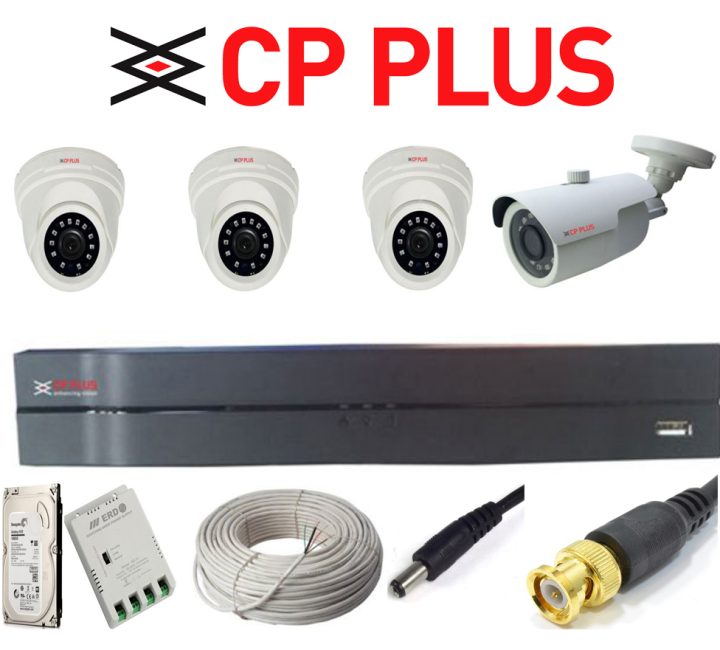
Keep in mind these cameras requires more regular maintenance as compared to latest IP or WiFi cameras one because of its working technology i.e Analog Signal. Analog cameras can face signal disturbances when high load electric wires goes nearby or if the length of the camera wires are longer. So its recommended to use a good quality wire with proper shielding film coating from a manufacturer like DLink, CpPlus etc. Don’t go cheap on wiring in this setup. Regular Maintenance like changing BNC (Baby Neill Concelman) Connectors required after around each 6-12 months depending on your setup weather conditions & wire joints sealing quality.
Currently there’s lots of manufacturers like CpPlus, Dahua, Hikvision, UNV etc who still provides these type systems but its future is almost at end, as it’s an Outdated technology.
Pros:
- Low Initial Investment
- Low Maintenance Cost
- Less complex wiring configuration
- Good value for basic security needs
- Affordable installation cost
Cons:
- Cannot match 4K capabilities
- Regular maintenance required
- Signal degradation over long cables
- No Analytics or Facial Recognition Capabilities
IP Cameras: The Smart Ones
IP cameras are network-connected Digital cameras that send and receive data via the internet based cat5 or cat6 cables or via other digital networks. They offer a wide range of features, such as high-definition video quality, night vision, motion detection, remote access and control, and integration with other security systems. They are highly customizable and can be used for a variety of applications, such as home security, business security, and surveillance.
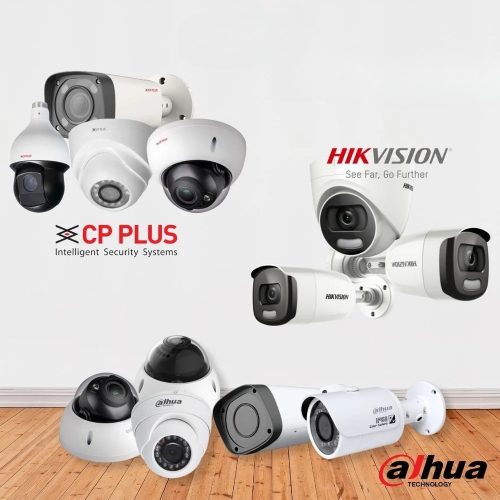
Although they cost more as compared to analog system, but it worth as these are quite reliable & needs less maintenance. you also need a stable internet connectivity to get remote access. It can be customized & used in long range setup by using multi point POE setups. It can be called as Best CCTV wired based cameras by considering its higher Pros vs Cons
Pros:
- High-definition up to 4K video quality.
- Improved Night vision capabilities.
- Motion detection & detailed analytics.
- Low Maintenance
- Works in Long Range & Highly Customizable Setups
Cons:
- High Initial Investment Cost
- Setup required quite Technical knowledge
- If not configured properly it can raise privacy/security concerns
WiFi Cameras: The Lazy Person’s Friend
No drilling, no wiring, just plug and play. Best CCTV setup for renters or if you’re as technically challenged as my uncle who still can’t figure out how smart tech gadgets works. There are wide options available, it comes with Fixed & Pan Tilt functions, Plus additional features like 2 way talk, Intrusion alert & inbuilt Cloud Storage Features. All Recording is done on SD card inserted inside Camera or on Manufacturer cloud (recurring rental plan required). When required users can watch or pull playback on his Phone via active Internet connection.
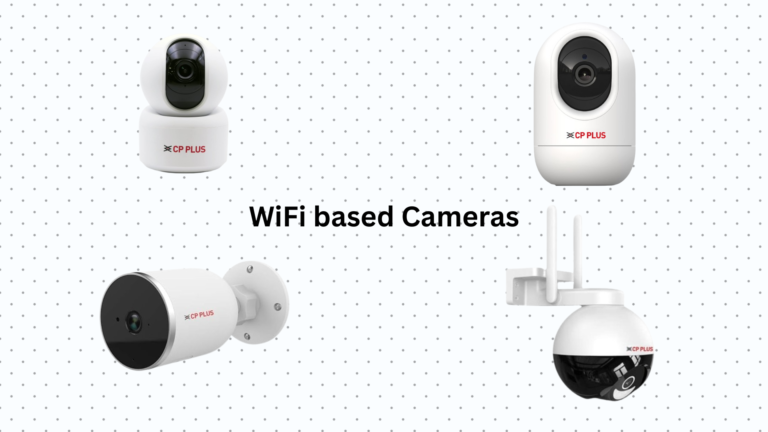
Some of the Best CCTV Brands launch these under alternative branding names like EzyKam by CpPlus, Ezviz by Hikvision, Dahua has Imou earlier but now its Dahua only, Uniview/UNV has UniArch & Tapo by TpLink.
There are other models also available under OEM (Original Equipment Manufacturer) Branding with endless random names like CareCam, XMEye, OKam Pro, Mastel, Dantum etc. Those OEM cameras costs lower in pricing, but these will compromise in Build Quality, Reliability, Security & Support by manufacturer as compared to branded manufacturers above. So choose these OEM brands only if you are very tight on Budget.
Pros:
- Easy to install, cheap on pocket and less cable hassle.
- Support remote viewing and smart home integration.
- Motion detection other basic functions.
- Low Maintenance.
- Multiple storage options like SD card or cloud storage.
Cons:
- Prone to WiFi interference and connectivity drops.
- Vulnerable to hacking if not secured properly.
- Video quality may degrade with poor network coverage.
- Cloud storage often involves subscription fees
SIM-Based: The Always-Connected Option
Remember those areas where No Broadband Wire or WiFi signal available ? These cameras works in those scenario where No stable Connectivity like WiFi or BroadBand available. These Cameras works via SIM Internet Data. They work like your phone – pop in a SIM card, and you’re good to go. These are best cctv suited for Remote Areas Surveillance like Farm House or Village Side Land. Many Best CCTV Brands Like EzyKam by CpPlus, Ezviz by Hikvison, & of course a lot from OEM brands provide these types of products.
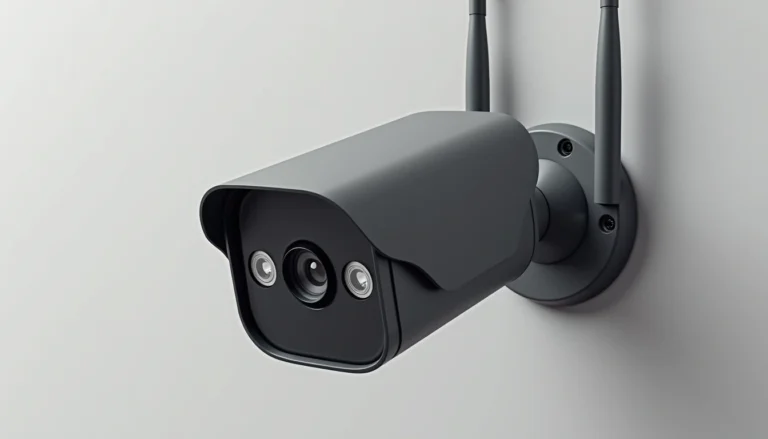
Pros:
- Work anywhere with cell signal.
- Easy, wire-free installation.
- Support solar/battery power for off-grid use.
- Low Maintenance.
- Multiple storage options like SD card or cloud storage.
Cons:
- High data costs for video streaming.
- Dependent on cellular network quality.
- May lack advanced/pro monitoring features.
- Battery/Solar maintenance required.
Solar-Powered: The Eco-Friendly Choice
Perfect for farm houses or anywhere power cuts are more regular than your morning chai. They’re a bit expensive upfront, but hey, free electricity forever!
PTZ Cameras: The Eagle Eye Watch
These can pan, tilt, and zoom like those fancy cameras in spy movies. Overkill for most homes, but great for big spaces or if you’re just tech-obsessed
Picking the Right One: A Reality Check
Here’s the truth – you don’t need the fanciest system out there. What you need is something that works for YOUR situation.
Ask yourself:
- What exactly am I trying to watch? (Your front door needs different treatment than your warehouse)
- How tech-savvy am I?
- What’s my actual budget?
Money Talk: Let’s Be Real
Listen, I’ve seen people blow their savings on systems they don’t need, and others try to secure a mansion with a ₹2,000 camera from that shady shop around the corner. Neither approach makes sense.
Quick budget guide:
- Basic setup: ₹15,000-30,000 (Perfect for most homes)
- Mid-range: ₹30,000-75,000 (Small businesses, larger homes)
- Premium: ₹75,000+ (When security is serious business)
Real-World Scenarios
For Your Home
Got kids and want to check on the babysitter? A couple of WiFi cameras might do the trick. Want to secure every entry point? Mix some IP cameras at the main gate.
For Your Shop
Running a small kirana store? AHD or Normal WiFi cameras covering the counter and storage area should work. Got a bigger showroom? Consider IP or PTZ cameras for those wide angles & better Video Quality.
The Bottom Line
Here’s what I tell everyone – start small, but start smart. You can always add more cameras later, but choosing the wrong system is like getting stuck in a bad marriage – expensive to get out of!
Remember:
- Don’t get sweet-talked into buying features you’ll never use
- Check the warranty (and actually read it)
- Factor in installation costs (they can sneak up on you!)
Final Thoughts
Security isn’t about having the most expensive system – it’s about having the right one. Take your time, do your homework, and don’t be afraid to ask questions.

Mr. Preet is a self-taught technical blogger and author with 5+ years of experience in CCTV technology guidance. He focuses on providing practical advice about choosing, installing, and maintaining surveillance systems. His content primarily covers basic CCTV concepts, helping readers understand how these security systems work in various settings, from home installations to commercial applications.

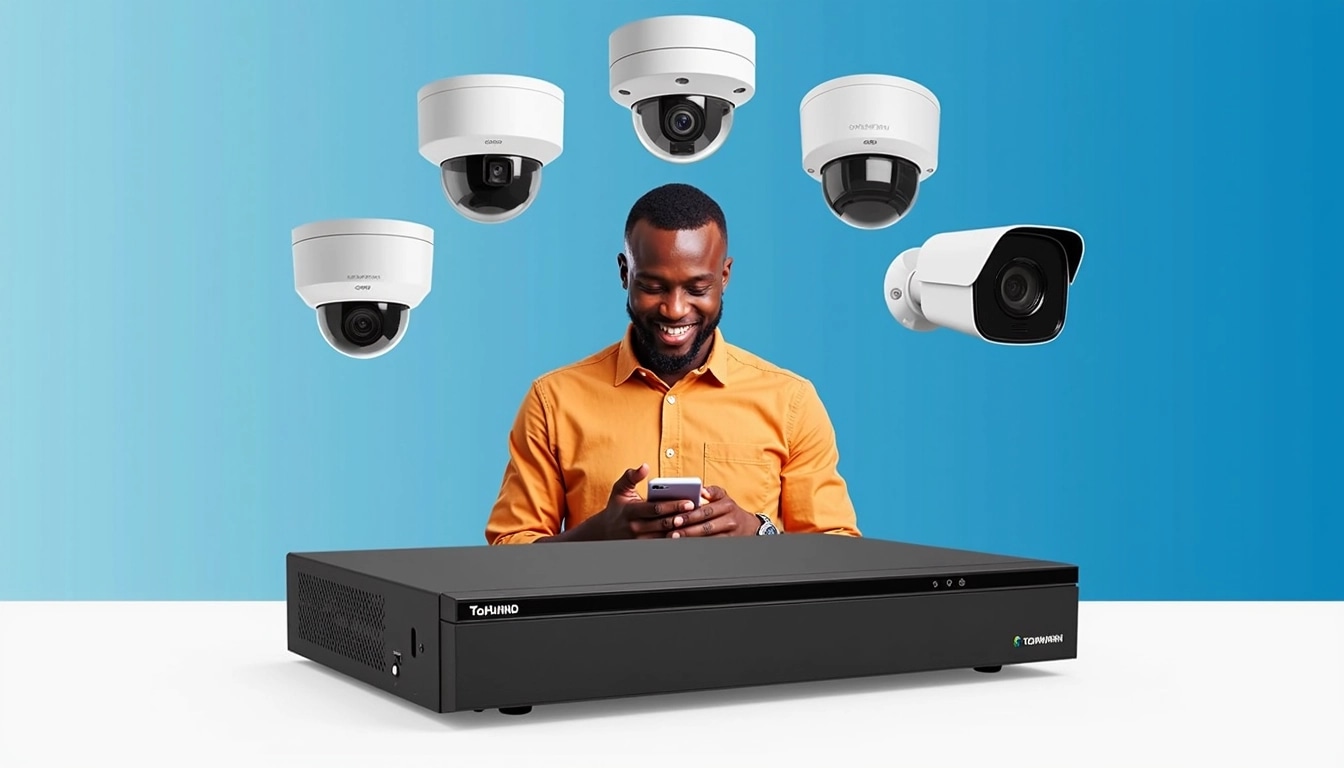


Very interesting information!Perfect just what I was searching for! “Love endures only when the lovers love many things together and not merely each other.” by Walter Lippmann.
It’s actually a great and useful piece of info. I’m glad that you shared this helpful information with us. Please keep us informed like this. Thanks for sharing.
I really appreciate this post. I’ve been looking everywhere for this! Thank goodness I found it on Bing. You’ve made my day! Thank you again
Wonderful blog! Do you have any recommendations for aspiring writers? I’m planning to start my own site soon but I’m a little lost on everything. Would you recommend starting with a free platform like WordPress or go for a paid option? There are so many choices out there that I’m totally overwhelmed .. Any tips? Thanks a lot!
Rattling nice pattern and fantastic subject material, nothing at all else we need : D.
My brother suggested I would possibly like this website. He used to be totally right. This put up truly made my day. You cann’t consider simply how much time I had spent for this info! Thank you!
Hello! Would you mind if I share your blog with my zynga group? There’s a lot of people that I think would really appreciate your content. Please let me know. Many thanks
Hey there would you mind sharing which blog platform you’re working with? I’m looking to start my own blog soon but I’m having a difficult time deciding between BlogEngine/Wordpress/B2evolution and Drupal. The reason I ask is because your layout seems different then most blogs and I’m looking for something unique. P.S Apologies for getting off-topic but I had to ask!